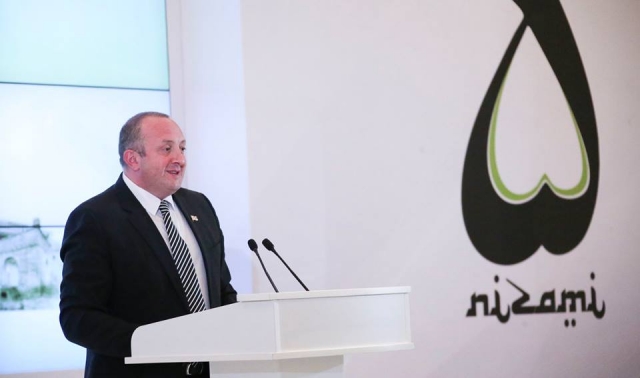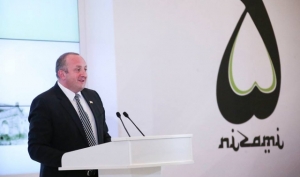Georgian President Slams Russia for Support of Separatists
BAKU – Georgian President Giorgi Margvelashvili harshly criticized Russia for its continued support of separatist rebels in Georgia’s breakaway Abkhazia and South Ossetia regions, saying Moscow’s actions amount to a creeping occupation of the South Caucasus and a major security threat to the region.
"Today, 20 percent of Georgia’s internationally recognized territory is occupied by the Russian Federation. 15 percent of our people are classified as internally displaced refugees because of Russia’s actions," Margvelashvili said.
He later launched into a scathing indictment of Russia and its authoritarian president, Vladimir Putin, accusing Moscow of wanting to pursue its global ambitions at the expense of its immediate neighbors, a reference to the countries that once constituted the Soviet Union.
“We never want to be subjected to the influence of an imperial power again. Ukraine – a peaceful, friendly nation for Russia – faced the same dramatic situation two years ago. Crimea was occupied and the war began in the east of the country,” Margvelashvili said in reference to Russia’s invasion and illegal annexation of the Crimean Peninsula.
Moscow shortly thereafter ignited a bloody war in eastern Ukraine that has killed more than 10,000 people since the outbreak of hostilities in April 2014.
While speaking on the sidelines of an official state visit to the Azeri capital Baku, Margvelashvili heaped praise on his host, Azerbaijan’s President Ilham Aliyev, and called for developing deeper economic and security ties with Azerbaijan.
Both presidents also vowed to respect each country’s territorial integrity and pledged to work in tandem to find peaceful methods to resolve the respective frozen conflicts within each other’s borders.
Azerbaijan and Georgia each suffer from long simmering, low-level conflicts in areas controlled or financed by Russia. Georgia’s Abkhazia and South Ossetia regions and Azerbaijan’s Nagorny-Karabakh district were all scenes of brutal interethnic conflicts in the early 1990s.
Russia’s armed forces and local separatists defeated the central authorities in each, leaving de facto Moscow-controlled proxy governments in charge and thousands of crack Russian troops based within their borders.
The wars left thousands dead and led to the creation of nearly a million internally displaced people.
“Neighboring countries should build bridges and form partnerships, but never occupy each other’s territory. We are a country that suffers from Russia’s imperial ambitions. Yet we still pursue a policy of cooperation with our neighbors as a way to promote both global and regional security,” Margvelashvili said during his press conference in Baku.
Margvelashvili’s comments come amid speculation from Georgia’s Special Envoy for Russian Relations, Zurab Abashidze, that Moscow may cancel its newly revised visa-free regime for Georgian citizens some time later this year.
The EU’s December 2015 announcement that it would grant visa-free travel to Georgian citizens prompted Russia to amend its entry policy for Georgian passport holders.












